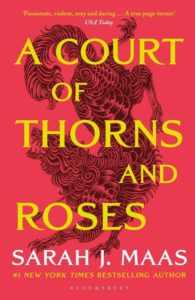NK Chats To… Helen Taylor
 Hello Helen, thank you for joining me today. Can you tell me about your book, Why Women Read Fiction and what inspired you to write it?
Hello Helen, thank you for joining me today. Can you tell me about your book, Why Women Read Fiction and what inspired you to write it?
I have always been fascinated by the fact that the main readers of novels and short stories are women. Currently we buy (and also borrow) about 80% of all fiction. Women are the vast majority of members of book clubs, attendees at literary festivals, visitors to libraries and bookshops, and organisers of days out to literary heritage sites like the Brontës’ Haworth Parsonage. Many years ago, I wrote a book about Gone With the Wind, and more recently a Daphne du Maurier Companion, and while researching both these, I was struck by how many women told me of their passion for both writers and their books, and how profoundly they had wrapped words, scenes, characters and settings into their hearts and their own life stories.
They had even called their daughters, dogs and cats after the protagonists (Scarlett, Rhett, Rebecca). So I set out to ask what it is about reading fiction that appeals to women – and I found it offers escape, a special space just for us (‘me-time’), and the opportunity to spread our wings intellectually and emotionally. It helps us through the night, and gives us insights into our relationships and families, as well as the world beyond. Jackie Kay suggests ‘our lives are mapped by books’.
Fiction is important to so many people (including me.) Which fictional novel has made the most impact on you and why?
At different stages of my life, particular books have resonated. As a girl, I wanted to be like awkward, unconventional and ambitious Jo March in Little Women. As a young student, George Eliot’s Middlemarch taught me about social and intellectual pretentiousness, and warned me never to marry an emotionally stunted man.
As a middle-aged and older woman, I’ve learned about worlds very different from my own through writers such as Ralph Ellison, Eudora Welty and Hilary Mantel. Toni Morrison’s Beloved about American slavery is the most devastating novel I’ve ever read, and Kate Chopin’s The Awakening is very dear to my heart because set in a special place of mine, Louisiana.
What were the challenges you faced when writing When Women Read Fiction?
I decided to send out questionnaires to women about their reading, and to interview women writers too. The enthusiasm with which over 400 women responded to my questions and the wonderful material they provided me with, were very humbling, and I had to try to do justice to it all. Women love to tell you about what reading fiction means to them – ‘a lifeline,’ ‘my best friend,’ ‘the love of my life’ – and all the ways they have found it helped them in sorrow, joy, sickness and health.
Women writers are very aware of their responsibility to, and friendly relationship with women readers, though they gave me angry accounts of being ‘Little Womaned’, as Hilary Mantel put it – reviewed, paid and valued less than male fiction writers.
What’s your writing day like and what do you need around you? For example, coffee, tea, music, silence?
Alas, I’m not an early riser, but when I get going (after many cups of good English Breakfast tea) I like to write to music – Joni Mitchell, Kate Rusby, Mozart, Leonard Cohen)- but when I REALLY get going and the writing is flowing, I work in silence. Those are the most productive and precious times.
 What’s the first thing you do when starting a new project? What comes next?
What’s the first thing you do when starting a new project? What comes next?
I am a slow burn writer. I was commissioned to write a BFI book about the film of Gone With the Wind and I finished it in three months, but usually it takes me years to shape an idea and produce a book.
I had the germ of an idea for Why Women Read Fiction thirty years ago, but I worked on it seriously for about five years. I think it’s a better book for taking so much time.
How do you approach the editing process?
Editing is my favourite process of all. I find research and first drafts time-consuming and difficult, but I love to edit.
Years of teaching students have given me considerable experience here, and I love to spot my own repetitions, clichés, weak phrases and poor arguments – then brutally cut and reshape. It’s the most creative process.
What’s your favourite word and why?
NK Chats To… Nicola K Smith
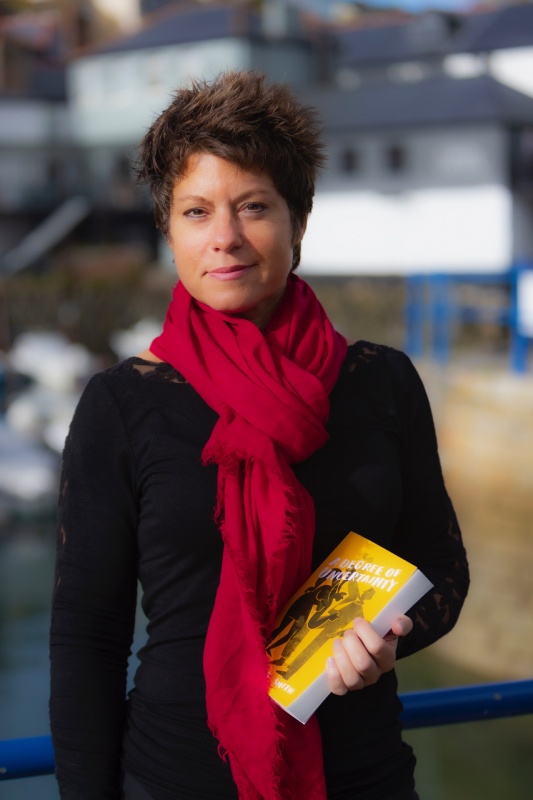 Hello Nicola, thank you so much for joining me today. Can you tell me a little about your debut novel, A Degree of Uncertainty and what inspired the story?
Hello Nicola, thank you so much for joining me today. Can you tell me a little about your debut novel, A Degree of Uncertainty and what inspired the story?
Thank you for inviting me to chat with Novel Kicks, Laura.
A Degree of Uncertainty explores how a Cornish community is being ripped apart by its growing university, with an influx of students upsetting the balance of things and challenging the way life has always been. Some residents — and business people — see it as progress and welcome the expansion. Others feel threatened by the change in dynamics.
Against this backdrop of small town politics, the story is very character driven, exploring love, friendship, loyalty and betrayal. The shifting community pits friends, neighbours and colleagues against each other and reopens old wounds…
Do you think character or plot is more important in a story?
I think that’s a little bit like asking which is more important, a bra or knickers… I agree that some books are weighted more in favour of one or the other, but for me, you need both. That doesn’t mean the plot has to be a rip-roaring rampage punctuated with multiple murders and endless twists, but the storyline needs to travel from A to B.
That said, I can really enjoy a book where a deeply plausible character goes on an emotional journey and, in essence, very little happens. But I don’t think the best plot in the world will stand up in the hands of characters in whom readers don’t believe or, worse, don’t care about.
What would be on a playlist for this novel?
One of the two key protagonists is Harry Manchester, a proud Cornishman and successful local businessman who vows to save his beloved community from being overrun by students and ruined by change. Harry is a keen music fan and ex-drummer and he often seeks solace in Queen music, letting the lyrics guide his mood and — in one instance — his actions. So it would have to be Queen’s Greatest Hits. (He also has an incident where his Bohemian Rhapsody ring tone goes off at an untimely moment, but that’s another story…)
What was the biggest challenge when writing your first book?
Starting a book is a challenge. I’d had the idea for a while and I began making notes and sketching out characters and plot, but actually writing those first words seemed like a terrifying leap!
I did a ‘Starting to write your novel’ course with the literary agency, Curtis Brown, which gave me the tools to plan and start the book. It also gave me a huge dose of confidence as I was chosen as ‘Most promising student’ on the course, and was rewarded with a one-to-one tutorial with one of the agents. That was a massive shove in the right direction, and the novel began…
What’s your typical writing day like? Where do you like to write? Do you prefer silence, do you need coffee?
Novel Kicks Fiction Friday: The Room
 It’s Friday which means it’s time to start writing some fiction.
It’s Friday which means it’s time to start writing some fiction.
Fiction Friday is our weekly writing prompt.
The aim is to write for a minimum of five minutes and then keep going for as long as you can.
Once you’ve finished, don’t edit, just post in the comments box below.
Today’s prompt: The Room.
Your character is guided into a room. There are four people already there, sat on two of the three sofas that line the walls.
Your character has never seen these people before…. or have they?
To begin with, no one talks to one another. When conversation begins, things are revealed.
Carry on the story…
Novel Kicks Fiction Friday: The Guest Book
 It’s Friday which means it’s time to start writing some fiction.
It’s Friday which means it’s time to start writing some fiction.
Fiction Friday is our weekly writing prompt.
The aim is to write for a minimum of five minutes and then keep going for as long as you can.
Once you’ve finished, don’t edit, just post in the comments box below.
Today’s prompt: The Guest Book.
As your spouse is away on business on the other side of the country, you decide to take a weekend away with a friend, staying at a lovely guest house on the coast. Being an hour away from home, it is still nice to have a change of scenery.
The owner of the guest house asks you to sign the guest book.
Whilst doing so, you scan the names on the page and spot that your spouse checked in… the day before.
My Writing Ramblings – Goodbye January, Hello February
 We are about to say goodbye to January and greet February.
We are about to say goodbye to January and greet February.
My niece turned 21 this month and if there is one thing that has done, it’s made me aware of time.
As I get older, I am finding that time is going so much quicker. It was something my Mum would warn me about but it’s easy to take time for granted.
Time. We always think we have more than we do.
Amongst other things, I have been thinking about the time I give to writing.
For many years, I have wanted to write a novel. It’s been my dream for a long time. Yet, I don’t allow myself the time and commitment it needs.
Why don’t I?
Confidence and not knowing where to begin are elements for sure, but I am coming to the belief that I am not respecting my goal to be a writer. Or in fact, my right to call myself a writer.
“I don’t have time.” “I would have done it but I ran out of time.”
These reasons are how I have justified it. When I sit back and look at it though, I realise that they are simply excuses.
NK Chats To… Michelle Vernal
Hello Michelle, thank you so much for joining me today and inviting me on your blog tour. Can you tell me a little about your novel, When We Say Goodbye and what inspired the story?
Thank you so much for having me.
When we say Goodbye is a story about love, loss and learning to live and open yourself up to possibilities.
This book was inspired by two things. The first was the loss of someone close to me when I was the same age as Ellie. I’d also not long bought an old house which I was in the process of doing up and I believe it was that house and the responsibility I’d taken on in purchasing it that helped me through a difficult time.
There are scenes in the story that I experienced first-hand. Secondly, we here in Christchurch, New Zealand lived through a massive earthquake which had devastating ramifications for people and I couldn’t set a story here, in Christchurch without acknowledging what happened in our city.
Do you think character or plot is more important in a story?
I write character driven novels. I don’t know if this is more important it’s just my style of writing.
What would be on a playlist for this novel?
Oh, a playlist would definitely feature Coldplay and Ed Sheeran.
 What’s your typical writing day like? Where do you like to write? Do you prefer silence, do you need coffee?
What’s your typical writing day like? Where do you like to write? Do you prefer silence, do you need coffee?
I need coffee before I do anything! My typical writing day starts after I’ve dropped my boys at school. I think about doing some exercise before I begin (then usually don’t!) before making a coffee and getting comfy on the couch in our conservatory. It’s a lovely space as we are surrounded by greenery and I can hear the birds and not much else.
Our black, three-legged cat called Blue usually joins me and I write until lunchtime. When I say write I flick far too often onto social media as I have a Facebook page I love interacting on.
After lunch, I carry on until it’s time to get the boys. Once they’re home, I have another coffee and work on the marketing side of being an author and then stop for the day when it’s time to make dinner.
Of course, if I have a book releasing and I’m up against it, which always seems to happen no matter how on top of things I think I am, I get back on my laptop after dinner. Most nights though my husband and I go for a walk. It’s important to get out and do that after a day in front of the computer.
What is your planning process like?
My planning is pretty much non-existent. A book begins with a thread of an idea and then I just find a place to start. I also find that the hardest part. I’m a definite pantser and the book comes together as I write.
Do you tend to edit as you go or wait for a first draft?
Novel Kicks Fiction Friday: Movie Scenes
 It’s Friday which means it’s time to start writing some fiction.
It’s Friday which means it’s time to start writing some fiction.
Fiction Friday is our weekly writing prompt.
The aim is to write for a minimum of five minutes and then keep going for as long as you can.
Once you’ve finished, don’t edit, just post in the comments box below.
Today’s prompt: Movie scenes.
Your character claims to have a glamorous life when in reality, they live their life through the films they watch on TV.
One day, they magically find themselves in the scene of their favourite movie.
They need to work to get out and back to real life but with every action, it is changing the outcome of the movie and therefore, your character’s knowledge of it.
NK Chats To… Patricia Ann Bowen
 Hello Patricia, thank you so much for joining me today and for inviting me onto your blog tour. Can you tell me a little about your novel, The Cure and what inspired the story?
Hello Patricia, thank you so much for joining me today and for inviting me onto your blog tour. Can you tell me a little about your novel, The Cure and what inspired the story?
I was at a meeting of Sisters in Crime in Atlanta when the leader asked the audience to write a quick book blurb and share it. I’d been doing a lot of volunteer work with senior citizens, and my dad had recently passed away with dementia, so the topic of Alzheimer’s was top of mind. I raised my hand with an idea, the audience applauded, and two long years later I published the book.
It’s women’s fiction, a tale of a woman with early-onset Alzheimer’s disease who is visited by a man from the future with a cure. I call it a hopeful fantasy. He’s a doctor, head of a medical research team, and needs her to conduct a long-term study to prove the safety and efficacy of their drug, and the only way for him to do this quickly is to get patients in the past to take the drug and get the results to him. The plot thickens as their relationship gets complicated, as the study must be done under the legal and ethical radar, and as the doctor ignores his directive to change nothing during his trip to the past.
What’s your writing day like and what do you need around you, for example, silence, coffee?
I either write or revise almost every day. If I’m writing, I shoot for at least one thousand words. If I’m revising, at least a couple of hours. I’m a morning person, up at around four most days, and my mental state is best early in the day. So, I’m that weird neighbour you see out walking in the dark of the morning in the light of the moon for exercise, then come home for coffee and breakfast, two cats show up on my desk, pictures of my muses surround me (Flannery O’Connor, Elena Ferrante, Pascal Garnier, Patricia Highsmith), my laptop has ready research available from google and Wikipedia, and I begin to write.
What’s your favourite word and why?
Great question. After much thought, I’d have to say “care”. I want to care about the important things, things that will help me and others, inspire me to give back to all who’ve helped me and cared for me. It’s easy to say we like something, but do we care about it?
Do we care enough about something to do something about it…put some time in for it? We have so many challenges today, life is not simple anymore, and I think that caring becomes a differentiator, whether it’s a small thing like making a good cup of coffee or a big one like what can I personally do to make someone else’s life better today.
Like write a better story, take someone away from their troubles for a page at a time. Listen, we writers aren’t in this for the money, and I love hearing that a reader cared about my story, that it made them think, or laugh, or grin, or even that it put them to sleep after a long day.
 How do you approach the editing process?
How do you approach the editing process?
With sheer dread. I can’t say that writing is easy, but I find it a breeze compared to editing and revising. It’s difficult to tear your own work apart, to read it like a reader and not the author of all those words. As for my process, I make five passes: first to review the draft and mark it up for obvious changes; second to enhance the plot, subplot(s) and scenes… too much detail, not enough, right details; third, enhance the characters and their dialog; fourth, check spelling, grammar, for weak and passive words, check names and dates and places; fifth, polish it, show off, spice it up, add some clues, ramp up the pace. Then I send it out to four to six beta readers and attend to their advice, making changes, rereading, reediting. There are no short-cuts.
Do you think character or plot is more important?
A Moment With… D.B. Carter
 A big lovely welcome today to D.B. Carter. His book, The Wild Roses was released by Mirador at the end of 2019.
A big lovely welcome today to D.B. Carter. His book, The Wild Roses was released by Mirador at the end of 2019.
Three friendships torn apart by one chance meeting. By autumn 1984 Sharon and Pip are in their final years of school and on the verge of adulthood. Best friends for as long as they can remember, the two young women befriend their badly bullied schoolmate, Gavin.
Their futures are bright until a chance meeting leads to a path of corruption, anger and malicious betrayal. Sometimes, when we can’t rely on those we love, our only hope is in the kindness of strangers. All three teens are driven from their homes to follow very different paths. They face dark times of heartbreak and new temptations.
But there may be ways out and better futures, if they are willing to take risks. What will they choose, and will they ever see each other again?
The Wild Roses is a coming-of-age drama for all ages that speaks honestly of love, loss, jealousy, coercion and self-discovery.
D.B. Carter has joined me today to chat about writing contemporary drama and romance and the challenges he faces. Over to you.
With two published novels, The Cherries and The Wild Roses, I’m starting to accept I may use “author” to refer to myself. I’ve worked in many sectors, including art, computer sciences, and business, but I felt I had come home to the place where I was meant to be when I started writing. My parents were artists and a creative drive runs deep in my psyche, but it took nearly half a century for fulfil my lifelong desire to write the kind of drama-romances that I’ve enjoyed for so long.
I’ve always enjoyed listening to people’s true-life stories. They give so many fascinating details and perspectives on society that the history books will never tell. When I was a lad, I would go with my mum to visit my grandmother, whereupon I’d be presented with a comic (generally the Beano or Dandy) and sent to read in the corner of the room while they chatted about life or reminisced about the past; even then, I realised how many anecdotes they had to relate and how many of life’s pleasures are to be discovered in small details. Since then, I’ve stored away decades of chats and reminiscences and they help me remember the rich assortment of people I’ve had the pleasure of knowing.
I hope I’ve carried these observations into my work as a writer. I’d never replicate anyone’s true story, but I draw inspiration from them. It seems to me we tell most about a character from how they react in a situation – the remarks they make or the tears they shed are testaments to their very souls. To me, the people who inhabit my books are real, and I often miss them when I finish writing.
I get so many kind messages from readers of my books, some of which touch me deeply. It’s a wonderful thing when someone says your writing has helped them in some way. I often cover difficult subjects, but I hope I do so in a compassionate and respectful manner, and I believe creating believable and relatable characters helps foster empathy.
NK Chats To… Patrick Canning
 Hi Patrick. Thank you so much for joining me on Novel Kicks today. Can you tell me a little about your novel, The Colonel and The Bee and what inspired the idea.
Hi Patrick. Thank you so much for joining me on Novel Kicks today. Can you tell me a little about your novel, The Colonel and The Bee and what inspired the idea.
The Colonel and the Bee is a Victorian Age adventure novel about a young acrobat who meets a larger-than-life explorer and the journey they go on together. The idea for the book was as simple as people flying around in a hot air balloon, getting into adventures, and the characters and themes followed.
What’s your writing day like, where do you like to write and do you have any writing rituals?
I try to write every day (though admittedly little on Sundays). I write in coffee shops because there are too many distractions at home. I wouldn’t say I have any real rituals other than a cold brew or iced tea, and I’ll either listen to the ambience of the space or something instrumental in my headphones to really focus in.
Can you tell me a little about your writing process from idea to final edit?
I always have a long phase of gathering material for a particular idea, and once that becomes enough for an outline, make a fairly general outline. Whenever the schedule allows, the outline goes into a first draft (which usually takes a few weeks). Then it’s many rounds of rewriting, outside feedback, and whatever else is necessary to get the book out.
What music would feature on a playlist for this novel?
Any kind of whimsical classical music. The soundtrack for the movie The Brothers Bloom might work.
What is more important when writing a novel, character or plot?
I think it depends on the particular novel. Stories that are more firmly rooted in genre will probably have a more plot-dependent execution because there are certain reader expectations, but if something is a little more literary or unconventional, character might take the lead. The boring but true answer is that both are simultaneously the most important, and in some ways inseparable if done correctly.
How do you approach creating a character?
NK Chats To… S.L Briden
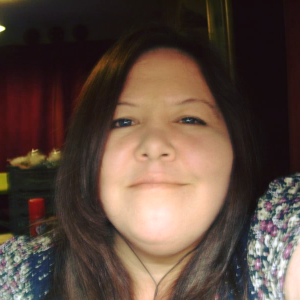 Hello. Thank you so much for joining me today. Can you tell me about From the Ashes, the first novel in your Shadows of a Phoenix series and how the idea originated?
Hello. Thank you so much for joining me today. Can you tell me about From the Ashes, the first novel in your Shadows of a Phoenix series and how the idea originated?
Since a young age, I’ve always been fascinated with the Arthurian legend and, later on in life, the dark ages of the UK. My late husband shared this fascination with me and together we spent many years researching myths and legends across the UK.
From our research, we discovered that the roman era of the UK displayed strong possibilities that their gladiators who used two swords in their arena’s, could have extended this battle technique over to the UK. Thus, we drafted the series, ‘Shadows of a Phoenix.’
I’ve always loved reading and writing stories but over the years I’ve found that some fantasy stories, including historic ones, tell of the battles and feats of the heroes and heroines conquers but didn’t give a realistic feeling of how anyone would cope mentally to be a part of it, even if the characters are made up and can perform sorcery.
To believe you would be brave and just carry on with life as normal was completely absurd to me, the same as if the weight of a prophecy was placed on your shoulders which states that you are the one to bring peace, so that is where the idea came to me that there needed to be a story out there that showed the true effects these things could have upon someone and the mistakes they make along the way.
That a prophecy is nothing to be rejoiced about when you are the one prophesied.
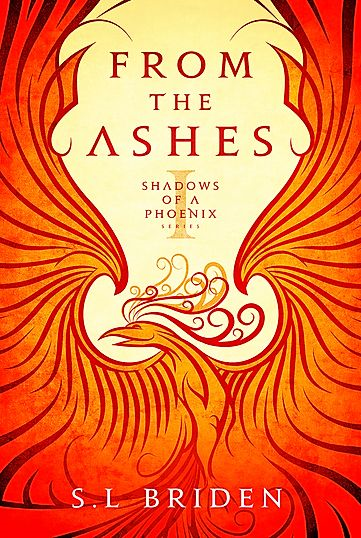 What is your typical writing day like? Are you the kind of writer that needs endless amounts of coffee? Do you prefer silence? When and where do you like to write?
What is your typical writing day like? Are you the kind of writer that needs endless amounts of coffee? Do you prefer silence? When and where do you like to write?
I mainly write in the evening at home but most of the time it’s not in silence. I write with my headphones on and listen to music to connect to me with different scenes that I’m writing.
I begin with a playlist that I add different scores to, to fit each scene, character or specific occurrence, be it just a single track or numerous ones for the same scene I am writing.
If whilst writing my draft I believe the track is suited to another scene, or it no longer inspires me, I simply move the track up, down or delete it.
I am always adding more tracks to each scene and deleting others whilst writing the novel which by the end of it gives me a musical outline of the story
Which fictional character would you like to meet and why?
Daenerys Targaryen. Putting aside that she’s turned into a mad queen toward the end of the Game of Thrones, she started as a scared young girl and turned into an amazing leader who sought to abolish slavery. Ok, and she can command dragons! lol
What’s your favourite word?
Muppet — I can be one myself at times lol
What are the challenges of writing a series of books?
Novel Kicks Fiction Friday: Cat’s Eyes
 It’s Friday which means it’s time to start writing some fiction.
It’s Friday which means it’s time to start writing some fiction.
Fiction Friday is our weekly writing prompt.
The aim is to write for a minimum of five minutes and then keep going for as long as you can.
Once you’ve finished, don’t edit, just post in the comments box below.
Today’s prompt: Cat’s eyes.
Where does your cat go when out on an adventure? I have always wanted to know and been fascinated about what the answer could be.
Your character finds that they have an insider view into the day of their cat. They get to follow them around and see where they go. Write about the day you have.
NK Chats To… L.M Brown
 Hello, L.M Brown, thank you so much for joining me today. What’s your typical writing day like?
Hello, L.M Brown, thank you so much for joining me today. What’s your typical writing day like?
It depends on what stage I am at. Before I start a project, whether it’s a novel or a short story, I plan it out. I think of the characters and their main story as well as the backstory.
This could take weeks or months with a novel, especially because I never start a novel now without reading at least 5 or 6 novels that I think might be similar.
With a story it could take an hour or so, and then I start writing. I like to get up before 6 when the house is quiet, and I work all the time I can. The re-write is my favorite part and its much easier to get up at 5 when I am there, because I have something to work with.
What’s the challenges of writing a collection of short stories?
For a collection, there needs to be a common thread linking all the stories together, so not every story might fit the collection.
For Were We Awake, the publisher didn’t think one story fit. It was a story about alcoholism and family dynamics, but Marc believed it was too normal and boring for a collection with ghosts, clowns, exotic birds and murders. So, I wrote a different story, and he was right. The collection was better for it.
What’s your favorite word and why?
I laughed when I read this, such a hard question. I like the word ‘pernicious’, though I can’t say I have a favorite word.
How do you approach the planning process when writing a book made up of short stories? What advice do you have for someone who would like to put together a short story collection?
Novel Kicks Writing Room: Unexpected Journey
 I am excited to be back with the first Novel Kicks Writing Room of 2020.
I am excited to be back with the first Novel Kicks Writing Room of 2020.
Today, it is writing about an unexpected journey.
Your character’s day begins like any other.
They wake up, have coffee, see the kids off to school, take the same bus and arrive for the same job they’ve held for a few years.
The plan is to work, go back home, eat with the family, have the same conversations, watch TV and then go to sleep for it all to start again the next day.
Yet, that evening, they are on a train and are far from home.
Write about what happens between work and this point and/or what happens after.
Novel Kicks Fiction Friday: Come Get Father Christmas
 It’s Friday which means it’s time to start writing some fiction.
It’s Friday which means it’s time to start writing some fiction.
Fiction Friday is our weekly writing prompt.
The aim is to write for a minimum of five minutes and then keep going for as long as you can.
Once you’ve finished, don’t edit, just post in the comments box below.
Today’s prompt: Where is he?
Father Christmas has been kidnapped. It’s all over the news around the world.
However, your character is made aware of this when a red, hand-delivered envelope is posted through their door. The number one has been printed on the front. The note inside reads…
A Moment With…. Lynne Shelby
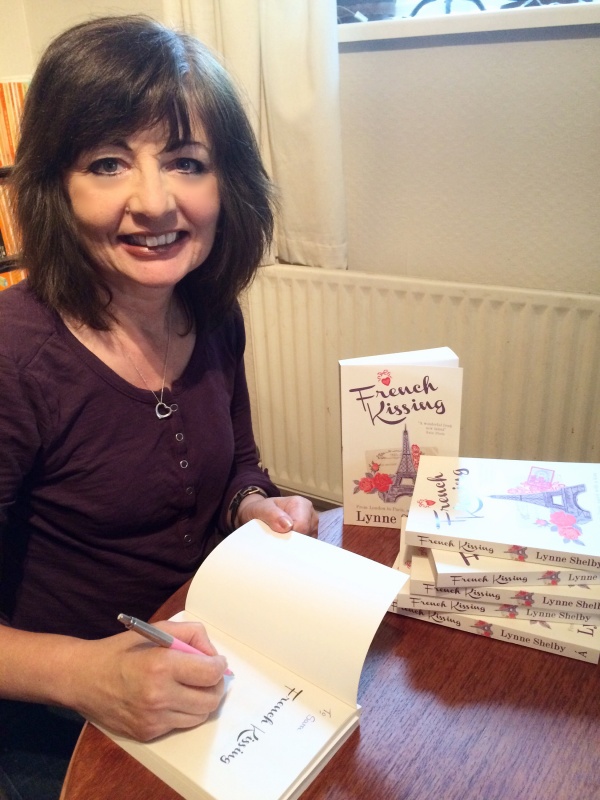 We have entered the last week of National Novel Writing Month. As you get to the end and are contemplating the edits, author Lynne Shelby has some advice about that all important first sentence.
We have entered the last week of National Novel Writing Month. As you get to the end and are contemplating the edits, author Lynne Shelby has some advice about that all important first sentence.
There are no hard and fast rules for writing that all-important first sentence of a novel, but I like to think of it as an invitation to a reader that will make them want to read on, a hint of what is too come without revealing too much.
An effective first sentence establishes an important aspect of the book. You could begin with a short statement of a fact that plunges the reader headlong into the story, or a line of dialogue that establishes the character of story’s narrator.
I think it’s best to avoid long, waffling description as this tends to put readers off, but a short, effective first sentence can set the style and mood of a novel, if it is comical, serious or even shocking!
What a writer is doing with a first sentence is showing the reader that something interesting is going on, encouraging them to take their first step into the world of the book.
Good luck to everyone taking part in NaNoWriMo.
About Lynne:
NK Chats To… RE McLean
 Say a big hello to RE McLean and the blog tour for her novel, Murder in the Multiverse. Thank you so much for joining me today. Can you tell me about your book, Murder in the Multiverse and what inspired the story.
Say a big hello to RE McLean and the blog tour for her novel, Murder in the Multiverse. Thank you so much for joining me today. Can you tell me about your book, Murder in the Multiverse and what inspired the story.
Thanks for having me here! Murder in the Multiverse is a geeky mystery, the kind of thing you’d enjoy if you like Jodi Taylor or Douglas Adams. It’s about Alex Strand, a physics postdoc who finds herself recruited to the top-secret Multiverse Investigations Unit. The MIU is based in the parking lot of San Francisco PD (in a Tardis-like VW campervan) and investigates crimes by visiting parallel worlds where the crime hasn’t happened – yet.
What’s the challenges of writing something like Murder in the Multiverse? Do you have an idea of where you want the series to go?
The main challenge is writing a book where the solution to the mystery always has some kind of link to quantum physics, while not being a quantum physicist myself. I’ve dealt with that by making the physics very silly – hard science this is not!
I have a ten-book outline for the series storyline. Each book will be focused on one specific crime, and take place in a new parallel universe. But the twin threads of Alex’s search for her mother across the multiverse and her growing relationship with Sarita, the mysterious materials scientist, will drive the series plot.
What’s your writing day like, where do you like to write and do you have any writing rituals?
I like to write in my local library, and I have a Spotify playlist to help me focus. And Schrödinger the quantum cat sits on my desk while I write!
If you could go and investigate anywhere, where would it be and why?
Definitely Silicon City, the parallel universe in Murder in the Multiverse. It’s got an augmented reality version of the internet and you can conjure up a plate of cookies just by thinking about it. And all the doors go swish-thunk, like in Star Trek.
 Which songs would be on a playlist for this book?
Which songs would be on a playlist for this book?
Good question! I’ve been putting together a playlist for Alex and her team, which you can find on Spotify. Alex is into retro tech (and music) and can only get to sleep to the sound of the Cheeky Girls. Her partner, Sergeant Mike Long, prefers easy listening. Alex wants to pull her eardum out with a fish hook when he puts that on the radio.
Do you think character or plot is more important?
I normally start a book with a concept, then decide who’s going to have to live with the consequences of that concept, then write the plot around that. Normally the characters come first for me, but I think both character and plot are equally important (and interwoven).
Which other authors have inspired/influenced you the most?
NK Chats To… Laura Briggs
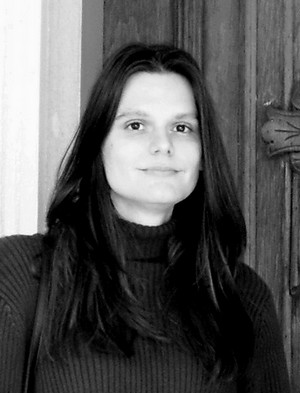 Hello Laura and welcome to Novel Kicks. Can you tell me a bit about your book, Sea Holly and Mistletoe Kisses?
Hello Laura and welcome to Novel Kicks. Can you tell me a bit about your book, Sea Holly and Mistletoe Kisses?
Hi Laura, and thanks so much for inviting me to share with your readers! Sea Holly and Mistletoe Kisses is a cosy Christmas read and the third book in my romance series known as ‘A Little Hotel in Cornwall’. It continues the adventures of Maisie Clark, an aspiring author who follows her writing dreams across the Pond to a quaint Cornish hotel by the sea. Readers can expect a festive, feel-good read, as Maisie and the rest of the staff at the Penmarrow prepare to host an ice sculpting competition at the historic hotel.
Are you able to tell me a little about what you’re currently working on?
Currently, I’m working on the edits for Book Four in the series, The Cornish Secret of Summer’s Promise. It features a daring heist, an unexpected secret, and a romantic crossroads that Maisie never expected!
When you begin a novel, what do you focus on first?
Hmmmm. I think it varies from project to project, but I tend to focus first on the central plotline or event that kicks off the story. Then the characters tend to develop alongside the twists and turns in the plot that help to bring the whole story together.
Which songs would be on a playlist for Sea Holly and Mistletoe Kisses?
Christmas songs! I have everything from classic to modern on my holiday music playlists, so it could feature anything from Bing Crosby to Mariah Carey songs.
What is your idea of a perfect Christmas?
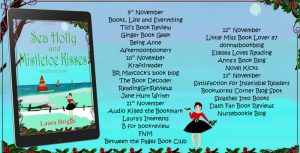 Oooh, that’s a tough one! I think something peaceful but festive and cozy that involves sharing the joy of the season with others would be a good place to start!
Oooh, that’s a tough one! I think something peaceful but festive and cozy that involves sharing the joy of the season with others would be a good place to start!
How do you approach the editing process and what is the biggest mistake that new writers make do you think?
Novel Kicks Writing Room: Witchy AGM
 It’s Friday which means it’s time to start writing some fiction.
It’s Friday which means it’s time to start writing some fiction.
Fiction Friday is our weekly writing prompt.
The aim is to write for a minimum of five minutes and then keep going for as long as you can.
Once you’ve finished, don’t edit, just post in the comments box below.
Today’s prompt: Witch AGM.
Your character is on their way to the annual witch meeting. The Witch AGM.
On the agenda, ‘Witches are not hags. Helping debunk the bad myths and stereotypes.’
What we can do to help our image. A practical workshop.
Novel Kicks Writing Room: Structure
 I am currently preparing for National Novel Writing Month. October is known as Preptober.
I am currently preparing for National Novel Writing Month. October is known as Preptober.
This got me thinking about structure and I have come across many variants of a three-act structure.
Take an idea you have and plan the plot using the following as a guide.
Act One:
1. Introduce your character and their world.
2. An event that sets the story in motion.
3. Determine what happens next.
Act Two:
4. Determine the goal that isn’t going to come easily.
5. The game changer.
6. The decision.
Act Three:
Novel Kicks Fiction Friday: Go Back and Read The Instructions
 It’s Friday which means it’s time to start writing some fiction.
It’s Friday which means it’s time to start writing some fiction.
Fiction Friday is our weekly writing prompt.
The aim is to write for a minimum of five minutes and then keep going for as long as you can.
Once you’ve finished, don’t edit, just post in the comments box below.
Today’s prompt: Go back and read the instructions.
Your character has invented a time machine. Now it is time to write the instruction manual, including a content page.
For example:
Novel Kicks Writing Room: Alphabet Story
 Welcome back to another writing exercise.
Welcome back to another writing exercise.
Today, I wanted to do an alphabet story. This exercise sounds fun but also a challenge.
Write a story but start each sentence with a different letter of the alphabet. In order.
For example…
Albert heard a knock and immediately opened the door.
Beaming at him, Tina stood in the hallway, a bag of groceries in her hand.
‘Come in,’ he said, stepping aside and letting her into the flat.
Novel Kicks Fiction Friday: Unexpected Speech
 It’s Friday which means it’s time to start writing some fiction.
It’s Friday which means it’s time to start writing some fiction.
Fiction Friday is our weekly writing prompt.
The aim is to write for a minimum of five minutes and then keep going for as long as you can.
Once you’ve finished, don’t edit, just post in the comments box below.
Today’s prompt: Unexpected Speech.
Your character is walking along the street when they are called over by a person they have never met before.
Before they know it, they are being led, by this stranger down a narrow corridor, through a door and onto a stage where there is an unusual looking audience.
Your character is asked a question. All eyes are on them.
Novel Kicks Fiction Friday: Pictorial Inspiration
 It’s Friday which means it’s time to start writing some fiction.
It’s Friday which means it’s time to start writing some fiction.
Fiction Friday is our weekly writing prompt.
The aim is to write for a minimum of five minutes and then keep going for as long as you can.
Once you’ve finished, don’t edit, just post in the comments box below.
Today’s prompt: Pictorial Inspiration.
Write about what this picture inspires….
Novel Kicks Fiction Friday: Step Back in Time
 It’s Friday which means it’s time to start writing some fiction.
It’s Friday which means it’s time to start writing some fiction.
Fiction Friday is our weekly writing prompt.
The aim is to write for a minimum of five minutes and then keep going for as long as you can.
Once you’ve finished, don’t edit, just post in the comments box below.
Today’s prompt: Step Back in Time.
Your character is disillusioned with life.
He or she is going through a marriage break up, the children don’t want to know them and to add insult to injury, they have lost their job.
They are sat drinking and then make a wish to be able to have a do-over.
When they wake up, they are eighteen again. Carry on the story…
Novel Kicks Writing Room: Edit, Edit, Edit
 For today’s exercise, I wanted to look at editing.
For today’s exercise, I wanted to look at editing.
Rewrite the following passage. Write up to 500 words. Try making it less passive, adding more emotion and details.
How did you find it?
*****
Mark goes into the flat and he sat down.
It had not changed much since he’d left a year ago.
He listened to Beth, getting the tea ready in the kitchen, She didn’t know what he was going to say to her.
She carried the tray in and handed him a mug. His favourite mug.
Novel Kicks Fiction Friday: Confession
 It’s Friday which means it’s time to start writing some fiction.
It’s Friday which means it’s time to start writing some fiction.
Fiction Friday is our weekly writing prompt.
The aim is to write for a minimum of five minutes and then keep going for as long as you can.
Once you’ve finished, don’t edit, just post in the comments box below.
Today’s prompt: Confession.
Your character is living in a country that, to the outside world is perfect. The truth is that the government is oppressing its citizens.
This character has lived in this country all their lives. Age, sex and life situation is your choice.
Your story begins when your character commits a serious crime.
Law enforcement is trying to get a confession and your character has been given a piece of paper and pencil.
Novel Kicks Writing Room: Freewriting with Prompts
 It’s another freewriting exercise today.
It’s another freewriting exercise today.
If you have something in mind already, then fantastic.
Write up to a 1000 words.
If you’re stuck as to where to start, there are five prompts below to hopefully inspire a story. You could always combine a couple if you like.
1. Write a letter to September.
2. Your character wakes up discovering that they are back at school.
3. You are stuck in a locked room alone with the person you despise the most.
4. You are confronted by the person you’ve been saying horrible things about online and they know it’s you.
Novel Kicks Fiction Friday: Alphabet Sentences
 It’s Friday which means it’s time to start writing some fiction.
It’s Friday which means it’s time to start writing some fiction.
Fiction Friday is our weekly writing prompt.
The aim is to write for a minimum of five minutes and then keep going for as long as you can.
Once you’ve finished, don’t edit, just post in the comments box below.
Today’s prompt: Alphabet sentences.
Your first sentence for today’s story is ‘All he could see was smoke.’
Now, carry on the story but with a little twist.
Novel Kicks Writing Room: Putting an Idea Together
 With National Novel Writing Month just over a month and a half away, I thought it would be nice today to generate some ideas using magazines as inspiration.
With National Novel Writing Month just over a month and a half away, I thought it would be nice today to generate some ideas using magazines as inspiration.
This part of the writing process has been scary for me but I also find it fun, especially when doing something like the following exercise.
Gather as many magazines as you can. Cut out any words, images and phrases that interest you/catches your eye for any reason.
Once you’ve done that, put them all in a hat.
NK Chats To… Laura Briggs
 Hi Laura. It’s lovely to welcome you to Novel Kicks today and happy book birthday for A Wedding in Cornwall. Can you tell me a little about it and what inspired it?
Hi Laura. It’s lovely to welcome you to Novel Kicks today and happy book birthday for A Wedding in Cornwall. Can you tell me a little about it and what inspired it?
Thanks so much, and very excited to share with your readers today! The romance read A Wedding in Cornwall is the first novella in a series that focuses on an American event planner’s adventures working at a Cornish manor house in a remote village. It was heavily inspired by other Cornish-themed stories, including the television shows Poldark and Doc Martin.
What’s your writing process like, from idea to final draft and how has it evolved from your first novel?
My writing process is actually much the same as when I first started. I usually start with brainstorming some notes, and then create an outline. This can range from anything from a few lines to describe each scene to a more full-blown, descriptive document outlining what happens in the story. From there, it’s just a matter of getting it all on paper and then onto revisions and editing for the final draft.
Where do you like to write, do you prefer silence and do you write longhand? Need coffee?
I work with a laptop, but my work station is most often in my living room (usually with a cat or two on hand for company!). I often work to music or sometimes a favourite television program, although silence is okay too. No coffee, but occasionally a cup of hot chocolate in the winter time!
What elements need to be in place for beginning a novel?
For me, the basic events of the story need to be outlined, so I don’t get too off track, so to speak! And I need to have some basic notes on character background too, even though certain things about both plot or characters may change as the story goes on paper.
Do you think plot or character is more important?
Novel Kicks Writing Room: The Middle is now the Beginning
 Today, I wanted to look at beginning in the middle.
Today, I wanted to look at beginning in the middle.
Look through your current work in progress or your idea book, preferably picking something where you know how you want to begin.
As usual, if you’d prefer to use a book you’ve recently read, that’s OK.
Have a think about the three major events that will happen in the middle of your book. Pick one.
Now, write that scene as though it is the beginning of your story.
Write about 500-750 words.
How was it? What does it do to your plot as it stands?
Novel Kicks Fiction Friday: Nigel
 It’s Friday which means it’s time to start writing some fiction.
It’s Friday which means it’s time to start writing some fiction.
Fiction Friday is our weekly writing prompt.
The aim is to write for a minimum of five minutes and then keep going for as long as you can.
Once you’ve finished, don’t edit, just post in the comments box below.
Today’s Prompt – Nigel.
Your story this week is about a young man named Nigel, who has just arrived in a strange city.
Use the following words in your piece of writing – bloom, exercise, paperwork, continuation, speculate and uncle.
Novel Kicks Writing Room: A Letter
 In the writing group today, we will be writing a letter.
In the writing group today, we will be writing a letter.
In this digital age, I am a little sad about the fact that the art of letter writing has diminished. I adore writing letters. There is something very personal about them.
Take two of your characters in your WIP or two of your favourite characters from fiction. You could even take a character from your WIP and an established fictional character if you wanted.
Write a letter from your main character to the other person about an event in your novel. Put in as much detail as you can. Once you’ve done that, write the reply.
Has this given you a new insight to these characters and how they react and feel?
NK Chats To… Holly Tierney-Bedford
 Hi Holly, I am so pleased you’ve joined me today. Can you tell me a little about your book, I Will Follow Him?
Hi Holly, I am so pleased you’ve joined me today. Can you tell me a little about your book, I Will Follow Him?
My story is about Francie, a private detective hired to follow a groom-to-be and his groomsmen as they go on a cruise. It’s a romantic comedy about a singles’ cruise, so there are lots of laughs, surprises, and (naturally) love.
What have been the challenges of writing within the Oceanic Dreams book series?
No challenges! It’s been great!
Do you need to have read the other books to read yours?
No. Every book can be read as a standalone story.
What is your writing process like, from idea to first draft? (If you are happy to provide a photo as an example of any part of the process, then that would be fantastic.)
I just jump in and start writing. I’m a total pantser, meaning I fly by the seat of my pants. Every story has a “feeling” to it, a mood, of those particular characters, setting, etc. When I signed on to the Oceanic Dreams project, I loved the light, fun premise. Although I didn’t have a particular plot or character in my mind until I sat down to write and saw what showed up, the series had been on my mind, percolating, for months before I started and I’m sure that helped me.
Is character or plot more important?
Character. I’d read a book about a fascinating person cleaning their house. I would not want to read a book with a great plot but characters who are boring.
How important is it to pick character names and how do you pick yours?
Important. I often change my characters’ names (find and replace) several times before I get it right.
Which authors do you admire?
Novel Kicks Writing Room: Contacts
 Starting a contacts page in your notebook.
Starting a contacts page in your notebook.
Today I wanted to look ahead and get prepared for what comes next. I know it is not a good idea to think too much beyond the completion of the book if you’re still working on the draft but I am hoping this is a helpful exercise.
It’s something I have been meaning to do for a while. If you’re a planner like me, then it’s an excuse to make a list.
With the genre of your book in mind, find five agents that handle the type of work you’re currently writing. Make a note of their postal address and e-mail too. The Writers’ and Artists’ Yearbook is good for this but obviously the internet may be more available to you.
Do the same with five publishers, whether they be a large or a small outlet. Be as specific as you can. Also, find the name of the person to whom you would submit the work. Like before, note down the postal address and e-mail address. Look for some online publishers too.
A Moment With… Julie Caplin
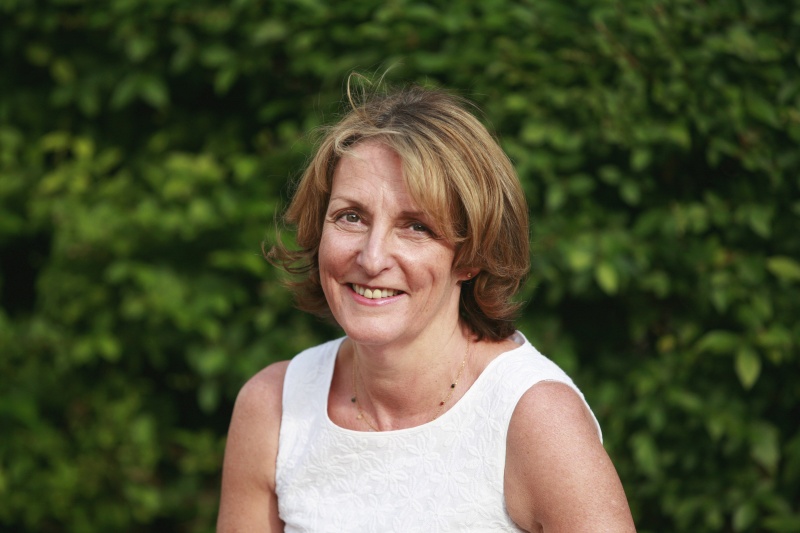 It’s finally the weekend. Julie Caplin joins me today with the blog tour for her novel, The Secret Cove in Croatia.
It’s finally the weekend. Julie Caplin joins me today with the blog tour for her novel, The Secret Cove in Croatia.
Sail away to beautiful Croatia for summer sun, sparkling turquoise seas and a holiday romance that’s forever…
When no-nonsense, down-to-earth Maddie Wilcox is offered the chance to work on a luxury yacht for the summer, she can’t say no. Yes she’ll be waiting on the posh guests… But island-hopping around the Adriatic sea will more than make up for it – especially when Nick, her best friend Nina’s brother, is one of them.
Sparks fly when they meet on board and Maddie can’t believe self-entitled jerk Nick is really related to Nina.
But in a secret, picture-perfect cove, away from the real world, Maddie and Nick discover they might have more in common than they realise…
Talking about the value of research, it’s over to you, Julie…
As I set my Romantic Escapes series in interesting, overseas locations, I’m often asked how I research my books.
These days with the internet at the tips of our fingers, it is so easy for authors to do their research from the comfort of their own homes and it is amazing what you can find out without ever having to leave home. However, as a writer, I’ve found that nothing quite beats proper first hand research thanks to those interesting little facts and insights that you pick up when you actually visit a place.
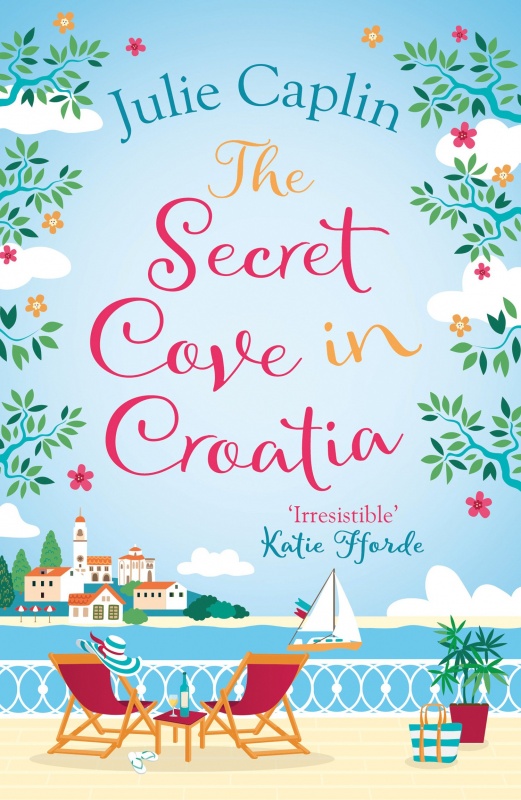 I’ve been to Italy, France, Spain, Portugal and Germany many times and I feel I have a reasonable understanding of the cultures of those countries, however when it came to writing my first book in the Romantic Escape series, The Little Café in Copenhagen, I had never been to Scandinavia let alone Denmark, so it felt really important that I visited Copenhagen to get a feel for the country and it’s people.
I’ve been to Italy, France, Spain, Portugal and Germany many times and I feel I have a reasonable understanding of the cultures of those countries, however when it came to writing my first book in the Romantic Escape series, The Little Café in Copenhagen, I had never been to Scandinavia let alone Denmark, so it felt really important that I visited Copenhagen to get a feel for the country and it’s people.
And it was exactly the right decision, I felt much more confident to write about the city once I’d been there.
With book five in the series, I decided to set the story in the beautiful country of Croatia. This was inspired by my lovely work colleague, Gordana, who grew up in Croatia. In our quieter moments (not many in a school office admittedly) she would show us the most wonderful pictures of the islands, the sea and the beautiful little towns. When my editor gave an enthusiastic thumbs up to Croatia as the next setting, I immediately knew that I needed a research trip to Croatia and specifically the Dalmatian Islands.
NK Chats To… Alex Brown
 Thank you so much for joining me today, Alex. Can you tell me a little about A Postcard From Italy and what inspired it?
Thank you so much for joining me today, Alex. Can you tell me a little about A Postcard From Italy and what inspired it?
Thanks for inviting me. A Postcard From Italy is my eighth full length novel and it’s a love story that spans nearly ninety years. Connie is harbouring a secret at the onset of the Second World War and then we fast forward to today where Grace opens a storage unit containing a lifetime of treasured belongings.
She then sets out to unravel the secret in a quest to right the wrongs meted out to Connie all those years ago and maybe find love for herself when she travels to the breathtakingly beautiful Italian Riviera.
What’s your writing process like (from idea to final draft) and how has it evolved since your first novel?
I’m not much of planner so I usually have an idea which I brainstorm with my editor before writing a synopsis which I then use as a rough guide to get me started. I write Monday to Friday and aim for at least a thousand words unless my deadline is looming and then I’ll write every day and into the night too for a week or two until the book is finished.
I start the day by editing the previous day’s words before writing on. My writing process hasn’t changed much since my first novel, although I procrastinate a lot less these days, I don’t have the time, and I always end the day by writing the outline for the following day … I like to know what’s happening next.
 Which elements do you think are important for a successful novel?
Which elements do you think are important for a successful novel?
There are so many variations but if you have a good story with a cliffhanger at the end of each chapter, so your reader feels compelled to read on, then you’re off to a good start. If you have wit and a sprinkle of wisdom too then even better.
Which fictional character would you like to meet?
Georgie Hart from my Carrington’s department store series. I love her so much and think we’d be the best of friends. It might sound daft but after writing four books she really does feel real to me and I miss her sometimes.
What other advice would you give to new writers like me?
NK Chats To… Des Burkinshaw
 Hi Des, thank you so much for joining me today. Can you tell me a little about your book, Dead and Talking and what inspired it?
Hi Des, thank you so much for joining me today. Can you tell me a little about your book, Dead and Talking and what inspired it?
It’s lovely to be here. Thank you for the invite. The novel is about a man who is forced to atone for the “sins” of his family by a sort of ghost – think It’s a Wonderful Life’s Clarence! – And he can only do that by righting some historical wrongs. He’s given the gift of being able to peer into the last moments of dead people’s lives if he’s near their remains. Which sort of helps. He’s a natural sceptic and thinks he’s going a bit mad but picks up some fellow travellers who help him. It quickly becomes an ensemble piece. Although set today, the first case he has to solve is of a private shot for desertion in WW1. He soon finds it is linked to his own family history.
It’s dark in places but is also funny because he and his helpers are all so reluctant to believe any of it is happening. There are some Ealing Comedy moments too. Tone-wise, it’s in the same ballpark as Hitchhiker’s Guide to the Galaxy. Though, as I say, the dark moments are pretty dark.
It was inspired by a few actual events from WW1. After I started plotting it, I also had to make a film about the role of soldiers from the Empire who fought for the British. I spent some time in Ypres, at the In Flanders Fields Museum and at some locations not open to tourists. It all sort of fitted together. Actually, doesn’t this show how research doesn’t just adorn the plot, it can become the plot?
What’s your typical writing day like? Is there somewhere specific you like to write?
I nearly always get up and go to a local coffee shop to get started for an hour or two on my laptop. I like to see the world go by before I hunker down behind the closed doors of my office. I write between 1-4 hours a day because I’m a filmmaker by trade and that takes up a lot of time. I wish I could spend more time writing.
How did your background in journalism help with writing your book?
Many ways. Not having a fear of the blank page helps a lot. Knowing how to plan, how to sub, how to edit. Knowing the importance of drafts and revisions. Welcoming constructive criticism and actually acting on it.
 But it’s also in the people I’ve met. I’ve spent a lot of quality time with Normandy veterans and other soldiers. Also, my starting point has always been a journalistic one of trying to see both sides of an argument and so, though a natural sceptic myself, I’m able to suspend that disbelief while writing, simply by putting myself in the mind of someone who does believe. Sceptic or not, who doesn’t love the idea that there are ghosts?
But it’s also in the people I’ve met. I’ve spent a lot of quality time with Normandy veterans and other soldiers. Also, my starting point has always been a journalistic one of trying to see both sides of an argument and so, though a natural sceptic myself, I’m able to suspend that disbelief while writing, simply by putting myself in the mind of someone who does believe. Sceptic or not, who doesn’t love the idea that there are ghosts?
What would your reaction be to a ghost? It would scare the hell out of me.
I’m a journalist. A sceptical journalist. But not a cynical one. I will never, ever believe there are ghosts until I see one myself though. I don’t care who else tells me. But if I did see one, I would use it as a basis to explore how I’d been wrong all this time. Sadly, I haven’t seen one – though I’ve seen quite a bit of death and spent a ridiculous amount of my life in cemeteries when I was younger. Always been a bit morbid.
I’d kill to see one. Even if I was afraid, I’d be delighted.
What’s your favourite word and why?
Novel Kicks Fiction Friday: Viral
 It’s Friday which means it’s time to start writing some fiction.
It’s Friday which means it’s time to start writing some fiction.
Fiction Friday is our weekly writing prompt.
The aim is to write for a minimum of five minutes and then keep going for as long as you can.
Once you’ve finished, don’t edit, just post in the comments box below.
Today’s prompt: Viral
Think about a typical day for you.
One event from this day gets recorded by a stranger and goes viral on social media, eventually making its way onto national news.
Continue the story using the first person point of view.

